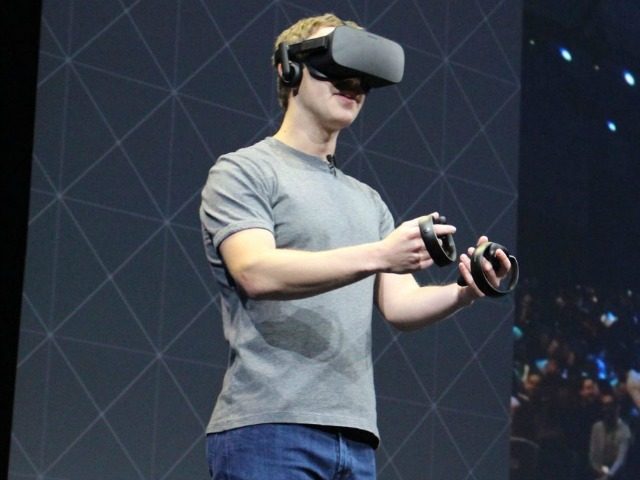Oculus VR, the virtual reality headset created by Virtual Reality (VR) pioneer and Trump supporter Palmer Luckey (who was later fired after Facebook acquired his company), has officially gone woke.
The Facebook-owned VR company announced a series of new features allowing players to decorate virtual spaces with pride flags, as well as a commemoration of the violent Stonewall riots.
From the Oculus blog:
This month’s Rift Platform update adds a collection of pride- and VR-themed posters, both a rainbow pride and trans pride flag, and new wallpapers for each color in the pride rainbow.
“Our pride content was worked on by a handful of LGBTQ artists here at Facebook and is thematically based around the idea of creating a safe space,” explains Oculus Home Content Producer JM Sudsina. “Prevalent among many marginalized communities, safe spaces are a concept in queer culture centered around symbols, signage, and objects that queer people use to designate that a location (usually a public space like a bar, coffee shop, etc.) is accepting of all sexual and gender identities. The simplest form of this is when you see a rainbow pride flag hanging outside of a public establishment.”
The post goes on to explain the various ways Oculus will allow you to celebrate pride month in VR-world:
In keeping with that theme, you’ll also find a pink triangle neon sign—a symbol reclaimed by the LGBTQ community that’s been used to designate safe spaces since the 1990s. Also, in honor of the 50th anniversary of the Stonewall Riots, Marsha the Unicorn Pride Plushie is named after gay liberation activist and Stonewall Riots participant Marsha P. Johnson—so she’ll make your Home a little more woke (and a lot more cute).
The Stonewall Riot — an incident involving arson, looting, and violence sparked by a police raid on a Mafia-owned gay bar in the 1960s — is widely perceived on the left as a milestone in the fight for gay rights. But some historians have argued that the police raid on the bar wasn’t sparked by a desire to crack down on the gay community, but rather by a dispute over between the police and the Mafia family that owned the unlicensed establishment and who bribed the authorities to let it remain open.
Oculus VR, now officially known as Facebook Technologies LLC, was born when Luckey announced the Oculus Rift in 2012. It quickly raised over $2.4 million in funds from users of Kickstarer, an online platform that allows consumers to contribute to early-stage projects. The success of Oculus kicked off a new era of popularity for VR, which had been a largely dead industry since the 1990s.
HTC, Sony, and other tech giants quickly began developing their own VR headsets to compete with Oculus. Oculus itself was bought by Facebook in 2014 for $2.3 billion.
Palmer Luckey, the father of modern VR, was initially placed in charge of Facebook’s new VR division. But after he was outed as a secret Trump supporter in 2016, the relationship between Luckey and Facebook’s higher-ups soured.
He was fired in early 2017, just a few months after President Trump’s victory. Testifying in front of a Senate committee, Facebook CEO Mark Zuckerberg denied that Luckey’s departure was due to his political viewpoints. But the Wall Street Journal later revealed that Zuckerberg took a personal interest in Luckey’s political viewpoints, going so far as to pressure the Oculus creator to publicly endorse Libertarian candidate Gary Johnson for president instead of Trump.
Luckey maintains that his support for Trump was a key factor in Facebook’s decision to dismiss him.

COMMENTS
Please let us know if you're having issues with commenting.